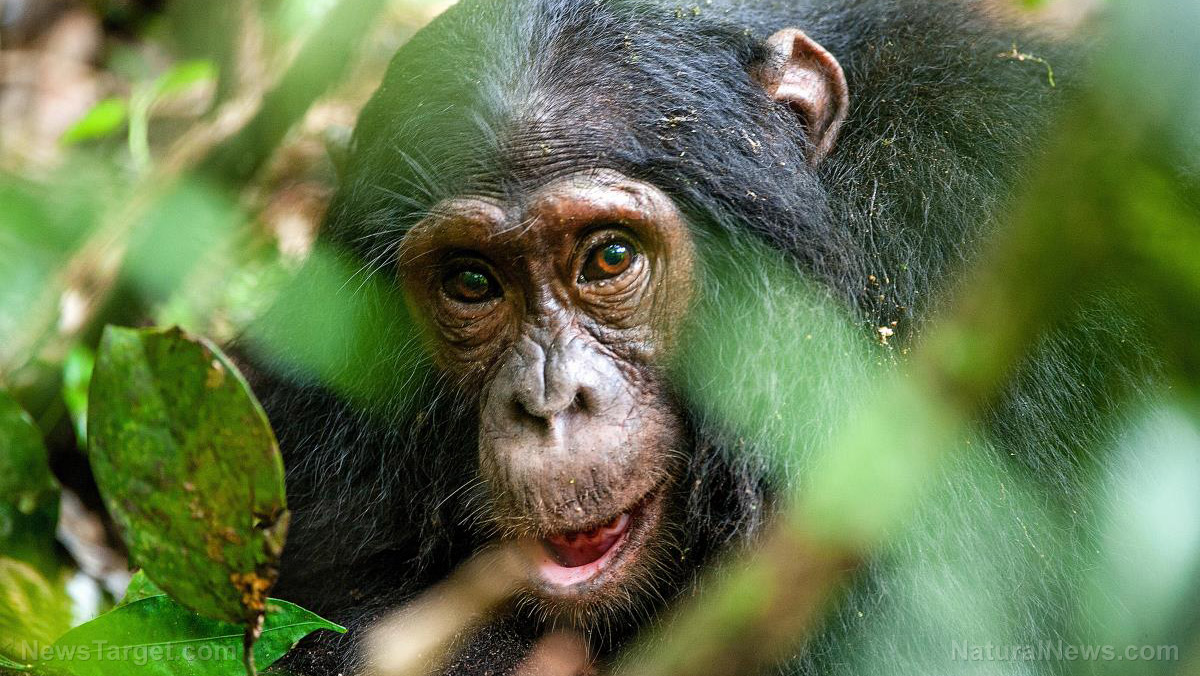Chimp mothers teach their offspring to use moss as drinking sponge in latest example of intelligent, conscious lives of primates
08/29/2018 / By Rhonda Johansson

Scientists have, for the first time, recorded evidence that prove chimpanzees learn from each other in the wild. Perhaps not so mind-blowing for some who already consider the primate to be our closest living relative, but the underlying implication of such a discovery is the possibility of a common ancestor between humans and chimps. The ability to pass down knowledge to future generations is considered to be a uniquely “human” ability. Researchers of this study hypothesize that this may not be true. Chimps are just as capable, they posit, to pass down culture and customs that would improve pre-existing techniques and strategies.
It has already been established that chimpanzee troops are distinctive in that they possess unique behaviors that separate themselves from other primates. Older studies have concluded that there are around 40 chimp behaviors which are socially acquired; a majority of these involving the use of tools such as wielding hammers and pestles. Interestingly, the remaining learned behaviors include courting rituals and social niceties.
“Researchers have been fascinated for decades by the differences in behavior between chimpanzee communities — some use tools, some don’t, some use different tools for the same job,” said lead study author and primatologist at the University of St. Andrews in Scotland, Catherine Hobaiter on Live Science. “These behavioral variations have been described as cultural, which in human terms would mean they spread when one individual learns from another, but in most cases they’re long established, and it’s hard to know how they originally spread within a group.”
On this, a few studies have observed the learning of new behavior among chimpanzees kept in captivity. There has never been direct evidence of this happening in the wild. Hobaiter and her team’s findings provide “the last piece of the puzzle,” Thibaud Gruber, a primatologist at the University of Neuchâtel in Switzerland excitedly proclaimed in the same Live Science article.
The Sonso chimpanzees: Displaying human-like learning behavior
Six years ago, a Sonso chimpanzee living in the Budongo Forest in Uganda, discovered a new way to drink water from a clay pit. Nick, a 29-year-old alpha male chimpanzee made a moss sponge that he would dip into the pit and then chew on to collect the water. This was a deviation from the “traditional” method of using “leaf bowls” which would not collect as much water. Nambi, a dominant adult female was recorded watching Nick use this technique and decided to try it out for herself. Over the next few days, seven more chimps chose to make and use moss sponges.
“The spread of the behavior was very fast,” Gruber observed. “This shows that chimpanzees can be really fast in adopting new tools!”
By 2014, the video footage showed that another 17 chimps used the moss-sponging technique. In only three years, researchers saw a notable increase of Sonso chimpanzees using the technique first established by Nick. Despite this, the moss-spongers did not abandon their default method of using leaves, instead using both methods in parallel to get the most water.
From the camera footage, researchers saw that moss-sponging behavior was mostly spread from mother to child, but other non-family members learned quickly if they saw other members of the group doing the same behavior. Gruber said on Daily Mail that “once a behavior has been developed and spread to a few individuals, the majority of the transmission will appear in the family, but if you hang out with some tool users, you’re still likely to develop a behavior by social learning.”
These findings further validate the higher-level of intelligence chimps share with us. Animal behaviorists are incredibly excited to conduct more research on the topic.
You can read more articles on evolution at Scientific.news.
Sources include:
Tagged Under: chimpanzees, Evolution, human evolution, learning, primate, primate behavior, primate intelligence


















